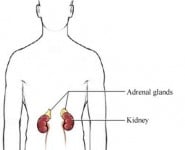
Stu: Have you ever considered that stress could be burning you out, interfering with sleep or holding your weight loss strategies hostage? I’ve spoken to so many people that say they simply can’t shift that stubborn body fat, even though they are eating well and exercising every day.
Immediately what springs to my mind is stress, elevated cortisol levels and ultimately adrenal fatigue. Naturopath Tania Flack has covered these issues in detail in this article.
When you think of being stressed, it’s easy to imagine someone flogging themselves at work until all hours trying to finish that essential deadline, but there are so many other factors to consider:
- Overtraining
- Poor sleep quality
- Psychological stress (worry, fear, anger etc)
- to name but a few…
So if you feel like you just can’t shift those extra kilos and are constantly running up hill, then I highly recommend you put the kettle on, sit down and enjoy the article below, over to Tania …
What is Adrenal Exhaustion?
The adrenal glands help to give us our get up and go. But if you are continually surfing on adrenaline and running on empty they can eventually start to under-function. So what is Adrenal Exhaustion and what can we do about it?
 The adrenal glands sit on top of the kidneys and are responsible for the secretion of adrenaline, cortisol, DHEA and other hormones that are required to help your body function during times of stress, whether it is physical, emotional or mental. Chronic stress causes the adrenal glands to become exhausted and so does the person. The whole body including the immune system becomes weak and vulnerable. Adrenal Exhaustion can be very detrimental to your over all health. It causes diminished cortisol and DHEA levels which can adversely affect thyroid and sex hormones.
The adrenal glands sit on top of the kidneys and are responsible for the secretion of adrenaline, cortisol, DHEA and other hormones that are required to help your body function during times of stress, whether it is physical, emotional or mental. Chronic stress causes the adrenal glands to become exhausted and so does the person. The whole body including the immune system becomes weak and vulnerable. Adrenal Exhaustion can be very detrimental to your over all health. It causes diminished cortisol and DHEA levels which can adversely affect thyroid and sex hormones.
Cortisol
Cortisol is one of the most important adrenal hormones. Normal cortisol levels are responsible for maintaining normal blood sugar levels, it mobilises fat and protein stores for mores energy and has an anti-inflammatory action in the body. Cortisol has an effect on most blood cells that participate in immune of inflammatory reactions as well as having an effect on blood pressure. It has an effect on electrolyte levels in heart tissue as well, heart beat, and influences the central nervous system controlling mood and behaviour.
During the early stage of adrenal stress, elevated cortisol levels contribute to weight gain, elevated cholesterol and blood pressure, altered brain chemistry (which causes depression and anxiety), it also has an effect on hormones and osteoporosis to name a few. During later stages of adrenal exhaustion the once high levels of cortisol eventually fall to low levels where it is insufficient to adequately normal function and good health.
DHEA Insomnia
Another important adrenal hormone that declines during periods of stress is DHEA which is considered the “youth or anti-ageing hormone”. DHEA’s main actions are through conversion into other more potent hormones such as estrogen and testosterone. It also appears to have its own action on the immune system and endothelial cells helping to boost the immune system and help protect against atherosclerosis.
If production of DHEA decreases under stress and is not rectified, a hormonal cascade can occur, resulting in a deficiency of sex hormones such as estrogen, progesterone and testosterone. If these hormones get too low then a whole range of other symptoms and problems can occur such as PMS, menopause, andropause and hypothyroidism.
3 Stages of Adrenal Exhaustion
Stage 1 – Alarm (fight or flight)
 In this stage the body launches into the fight or flight response by releasing elevated levels of noradrenalin, the “anti-stress hormone” cortisol and the”youth/anti-ageing hormone” DHEA. In short bursts this is a healthy reaction and the adrenals cope well, but as stress continues the adrenals are put into overdrive to cover the early signs and symptoms of fatigue. The pancreas is also effected, blood sugar becomes imbalanced, resulting in low energy. Many use a quick fix of either sugar, carbohydrate or caffeine at this stage to over come fatigue.
In this stage the body launches into the fight or flight response by releasing elevated levels of noradrenalin, the “anti-stress hormone” cortisol and the”youth/anti-ageing hormone” DHEA. In short bursts this is a healthy reaction and the adrenals cope well, but as stress continues the adrenals are put into overdrive to cover the early signs and symptoms of fatigue. The pancreas is also effected, blood sugar becomes imbalanced, resulting in low energy. Many use a quick fix of either sugar, carbohydrate or caffeine at this stage to over come fatigue.
Stage 2 – Resistance (fatigue & sleeping difficulties)
 With chronic or severe stress the adrenals become unable to cope. Many people carry out their every day activities but really start to struggle with fatigue. The body needs more rest and is slower to recover. Anxiety starts to set in and people become more irritable and less able to cope with stress. Sleep difficulties are common and the body starts to show other symptoms such as hormonal problems and hypothyroid type symptoms like cold intolerance, sluggish metabolism and weight gain. Often the thyroid gland is effected at this stage.
With chronic or severe stress the adrenals become unable to cope. Many people carry out their every day activities but really start to struggle with fatigue. The body needs more rest and is slower to recover. Anxiety starts to set in and people become more irritable and less able to cope with stress. Sleep difficulties are common and the body starts to show other symptoms such as hormonal problems and hypothyroid type symptoms like cold intolerance, sluggish metabolism and weight gain. Often the thyroid gland is effected at this stage.
Stage 3 – Exhaustion (shut-down)
 As adrenal function weakens further the adrenals are no longer able to keep up and cortisol output starts to decline. The body enters a survival stage where its main aim is to conserve energy in order to survive. This happens very gradually. The body starts taking energy from tissues, this stage results in muscle breakdown and protein wasting. Exercise tolerance is reduced and depression, chronic fatigue and fibromyalgia is common. Every major system of the body is effected including the immune, hormonal, neurological and metabolic systems.
As adrenal function weakens further the adrenals are no longer able to keep up and cortisol output starts to decline. The body enters a survival stage where its main aim is to conserve energy in order to survive. This happens very gradually. The body starts taking energy from tissues, this stage results in muscle breakdown and protein wasting. Exercise tolerance is reduced and depression, chronic fatigue and fibromyalgia is common. Every major system of the body is effected including the immune, hormonal, neurological and metabolic systems.
Signs and Symptoms of Adrenal Exhaustion are usually a combination of some of the following:
- Ongoing fatigue and exhaustion
- Feeling rundown
- Decreasing ability to cope with stress
- Poor stamina and exercise intolerance
- Lightheaded when standing up
- Difficulty getting out of bed
- Non-refreshing sleep and sleep disturbances
- Feeling mentally foggy, difficulty concentrating
- Low body temperature
- Low blood pressure
- Craving salt, sugar and carbohydrates
- Weight gain around the abdomen
- Hormone resistance, glucose intolerance, hypoglyceamia
- More prone to illness and infection, slow to recover
- Increasing hormone problems
- Hot flushes
- Depression and low mood
- Poor digestion
- Dark circles under the eyes
Adrenal Exhaustion can lead to….
Ongoing severe stress and adrenal depletion can lead to serious health problems and acute adrenal insufficiency. Generally, the earlier symptoms of adrenal exhaustion (Stages 1 + 2) are debilitating enough to force people to seek help. The earlier it is identified and treated the better the chance of recovery.
What Causes Adrenal Exhaustion?
- Any major life stress, work, relationship, family etc
- Physical, emotional or psychological stress
- Lack of sleep
- Overexertion and over work
- Poor diet
- Alcohol, caffeine, nicotine and recreational drugs
- Excess sugar and high carbohydrate diet
- Acute or chronic allergies, infection or illness
- Toxins, pollutants and exposure to heavy metals
- Fear and anxiety
- Death or serious illness of a loved one
The link between Stress and Adrenal Exhaustion
Many people don’t realise that the body responds to different kinds of stressors in the same way, so when we talk about stress many people only consider emotional stress.
Here are some examples of the types of stress that can contribute:
- Environmental Stress: Heat, cold, noise, light
- Chemical Stress: Pollution, toxins, chemicals, drugs, caffeine, nicotine and alcohol
- Physical Stress: Overexertion, trauma, infection, injury, surgery
- Psychological Stress: Worry, fretting, anxiety, anger, agitation
- Biochemical Stress: Nutritional deficiencies, excess sugar, high carbohydrate diet, dehydration
- Emotional Stress: Any major life event, death, birth, changes in relationships, work
Adrenal Exhaustion and Mental Health
Depression and anxiety are commonly associated adrenal exhaustion. Adrenal hormones are involved in cognitive function, mood and mental states in complex ways. The hypothalamic-pituitary-adrenal function is effected during depression. Stress, with associated high cortisol and DHEA has been associated with anxiety and depression, and people with low levels of DHEA and cortisol have been seen to experience depression, brain fog, difficulty concentrating and poor memory recall. Fluctuations in night time cortisol add to sleep disruption experienced associated with depression.
How is Adrenal Exhaustion Detected?
Low levels are detected by either a blood, urine or salivary hormone test. Repeated cortisol levels are usually taken through out the day to get an accurate picture of adrenal status.
What Other Tests are Useful?
As adrenal exhaustion effects many body systems, it is important to have a thorough check up if you have been diagnosed with low adrenal function. It is important to look at hormonal, cardiovascular and mental health as well as assessing your ideal weight.
Can Adrenal Exhaustion be Reversed?
Adrenal health can be restored, providing steps are taken to address stress, and that diet and lifestyle are optimal. Many herbal medicines and nutritional supplements are effective in addressing low adrenal function. It can take some time to achieve results, but the quicker it is identified the faster you can address it. It is always easier to address adrenal fatigue in its earlier stages, so if you feel you you may be suffering from adrenal fatigue seek professional help as soon as possible.
Top 10 Tips for Beating Adrenal Fatigue
- Stress: It is imperative that you address all stressors in your life, if emotional stress has played a role, its time to get some counselling.
- Lifestyle: Its easy to push yourself if you’re used to surfing on adrenaline, but taking a good look at your lifestyle and making some positive changes really helps
- Relaxation Techniques: Whether it be yoga, meditation or cooking, find what works to relax you and make time for it every week.
- Exercise: Probably the last thing you’ll feel like doing but regular gentle exercise it a true stress buster.
- Diet: Out with the fast food and in with regular, nutritious meals, nutritional deficiencies are just another form of stress, so eat well. Get some professional advice on this if you don’t know where to start.
- Avoid Stimulants: Alcohol, sugar, caffeine, nicotine, recreational drugs have all got to go.
- Address any other health problems: Chronic allergies, infections and leaky gut are all a source of stress on the body, get these sorted out asap!
- Hydrate: Drink at least 8 large glasses of water per day, dehydration adds to your stress load
- Just say no: Don’t over commit your self, manage your work/life balance and be a bit selfish so you can give yourself time to recover your adrenal health
- Get some Professional Advice: See your Naturopath, herbal and nutritional medicine can make the world of difference. Don’t rely on over the counter products and guesswork. A well balanced treatment plan from a professional Naturopath, including dietary, lifestyle, herbal and nutritional medicine will really help.
If you want to know more, you can contact Naturopath Tania Flack here.






4 Replies to “Understanding Adrenal Fatigue & 10 Tips To Beat It”
Great article, identifying the different types of stress is really helpful because people may not realize how things like chemical in or on their food and toxins in their environment can affect their body and weight. Thanks.
What happens to you if you are in the over 55 loop of not working for 12 months and you have applied for hundreds of jobs in that time ?, ( yes I have read that employers WANT those over 55 and value them, but that is just BS ) that is STRESS to the max !, bills pile up, our society doesn’t have answers there. How does one get out of that loop ?. The usual remedies don’t work !, by this time savings are gone and things have been sold, so answers anyone ? and no I am NOT a negative person, eat well, don’t smoke and drink and enjoy life.
Great article. So damn relevant to today’s crazy busy world.
It should be mentioned that traumatic experiences from the past can still cause stress in the present. This is called Traumatic Stress Disorder (PTSD).
However, great article, thank you.
Comments are closed.